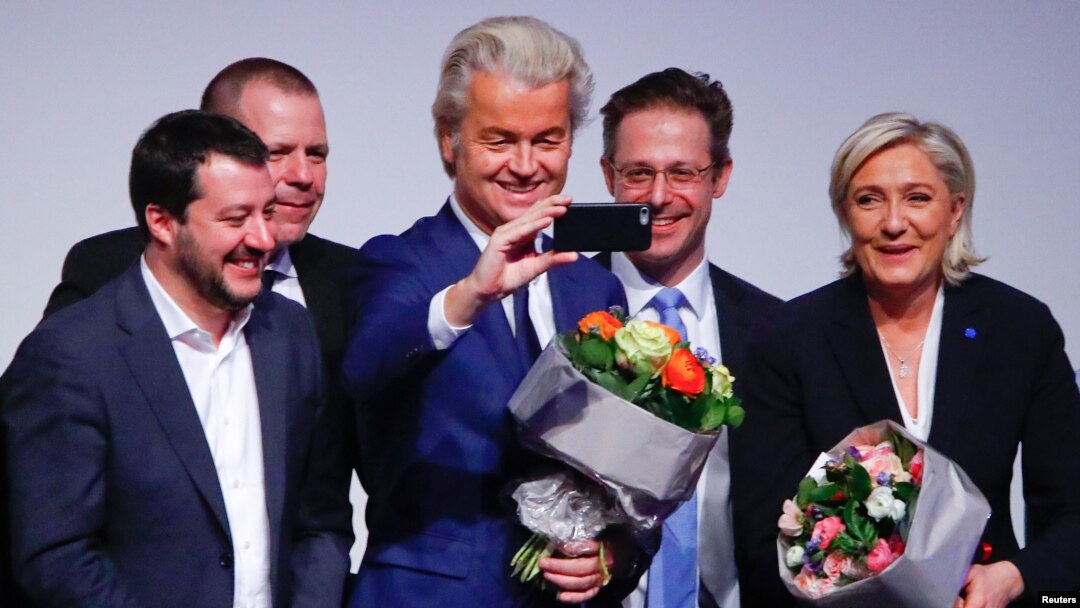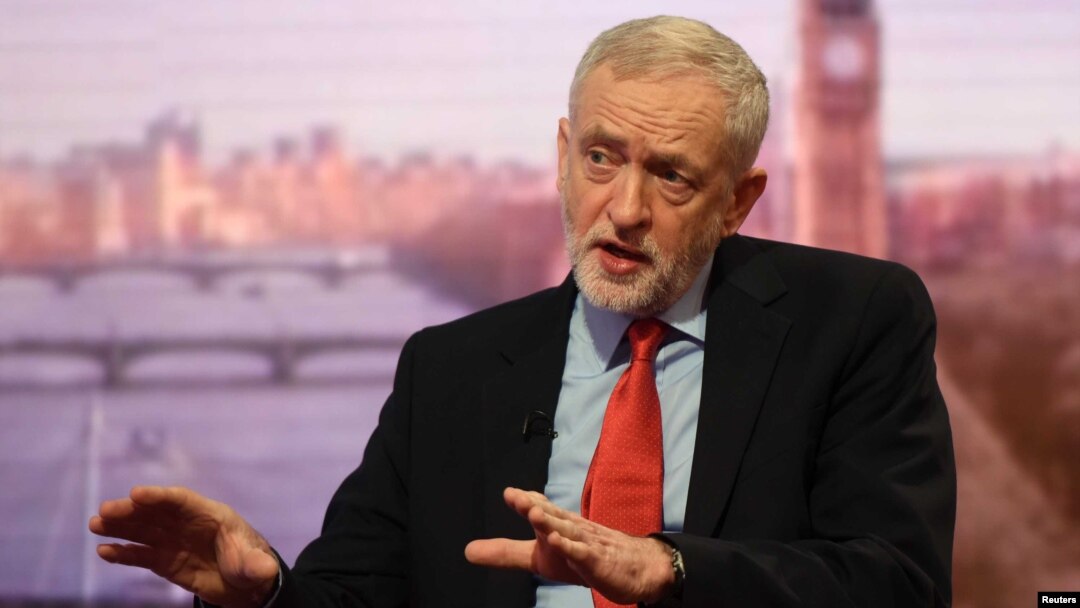Europe’s traditional left-wing parties are battling a headwind of disapproval from their traditional supporters, and with populist nationalists poised to exploit working-class discontent, they’re facing gloomy electoral prospects.
With rage mounting over inequality, stagnating wages and rising immigration, left-wing politicians fear they are facing wipeouts in a series of elections scheduled this year.
Buoyed by Donald Trump’s insurgent election victory in the United States, Europe’s populist nationalists, such as France’s far-right presidential hopeful Marine Le Pen, boast that 2017 will be the “year of the awakening of the people of continental Europe.”
She joined fellow European nationalists Saturday at a conference in Germany to show off their confidence as they enter a year that will see high-stakes elections in the Netherlands, France and Germany, and possibly Italy where calls for a snap election are mounting.

Netherlands' Party for Freedom (PVV) leader Geert Wilders takes a picture during a European far-right leaders meeting to discuss about the European Union, in Koblenz, Germany, Jan. 21, 2017.
‘A new Europe’
“Yesterday, a new America. Today a new Europe!” Dutch nationalist Geert Wilders said in his speech at the conference in the German city of Koblenz.
Wilders harbors no doubts that Europe’s “alt-right” parties will be able to poach traditional liberal voters, much as Trump managed to do in November in America to pull off an upset victory. And pollsters agree.
Wilders’ Party of Freedom is likely to win, polls say, the largest percentage of votes in the March 15 Dutch parliamentary elections. Polls also suggest Le Pen is likely to make it to the final runoff in France’s April-May presidential vote.
And in September, Frauke Petry’s Alternative for Germany party appears on course to win seats in the country’s national election and enter the German parliament for the first time.
“We are experiencing the end of one world and the birth of another,” Le Pen said in her address Saturday to the conference.
Struggle for strategy
Europe’s left-wing parties are struggling to come up with strategies that will fend off the challenge and reinvigorate their fading appeal. Critics say the parties don’t have practical answers to what worries voters on low and middle incomes as globalization and technological change upend their lives.
Opinion polls in France suggest whoever wins the Socialist Party nomination to stand in the presidential race appears destined to fail to qualify for the second round of France’s presidential election May 7. That will likely leave Le Pen to confront conservative Francois Fillon.
FILE - Francois Fillon puts his hand on his heart after delivering a speech following the conservative presidential primary, in Paris, France, Nov. 27, 2016.
“The crisis of the European left is undeniable,” according to Marc Lazar, a French history professor. “We’re in a phase of Europe’s history where the economic crisis, the refugee and immigration problem, the European Union challenges, put the traditional parties from the left in a tough spot.”
Internal party squabbles
And there is no consensus within Europe’s beleaguered left-wing parties about how to get out of the tough spot they’re in, whether they are now in opposition, as in Britain, or still in government, as in France. The prospects of defeat are triggering fratricidal disputes between moderates and radicals.
Internal party divisions are especially heated in Britain’s Labour Party. The country isn’t scheduled to have an election until 2020, but it is seeing its support crumble in its heartlands of northern England and the Midlands.
According to a think tank affiliated with Labour, the Fabian Society, the party’s chances of forming a majority government in 2020 are unthinkable. It argued in a recent report that it is on track to record its worst electoral performance since 1935.
“Labour is too weak to win,” says by Andrew Harrop, Fabian general-secretary.
Left-wing Scottish nationalists wiped out Labour in Scotland years ago. The threat now is from the populists of UKIP, the Euroskeptic UK Independence Party of Nigel Farage, the first British politician to secure a meeting with Trump after his November election victory.
Labour’s danger was exposed brutally last year with the Brexit vote. The party saw an unprecedented meltdown in its northern heartlands as working-class supporters in droves voted for Britain to leave the European Union, despite the party leadership and most Labour lawmakers campaigning to remain.
Across the country, 149 of 232 constituencies represented by Labour lawmakers voted to leave the European Union, according to an analysis by Chris Hanretty of the University of East Anglia.
Party moderates blame the Brexit setback on Jeremy Corbyn, the party’s most left-wing leader in years. They argue he pursued a lackluster campaign as his own views towards the EU were filled with ambivalence.
But Labour’s problem, as with left-wing parties on the continent of Europe, appears to go beyond individual leaders and to predate them. After months of vicious internal party squabbling, a challenge to Corbyn’s leadership failed, locking the party into a cosmopolitan and internationalist socialism that’s helping to disconnect the party with traditional working class and middle class supporters, argue party moderates. They warn voters’ worries about sovereignty, national identity and immigration are going unanswered.
Now, some of Labour’s brightest stars are exiting the party or active politics. Earlier this month, lawmaker Tristam Hunt, a historian once seen as potential party leader, quit. Weeks earlier, another lawmaker, Jamie Reed, resigned his parliamentary midterm warning Labour had developed a “tin ear.”


